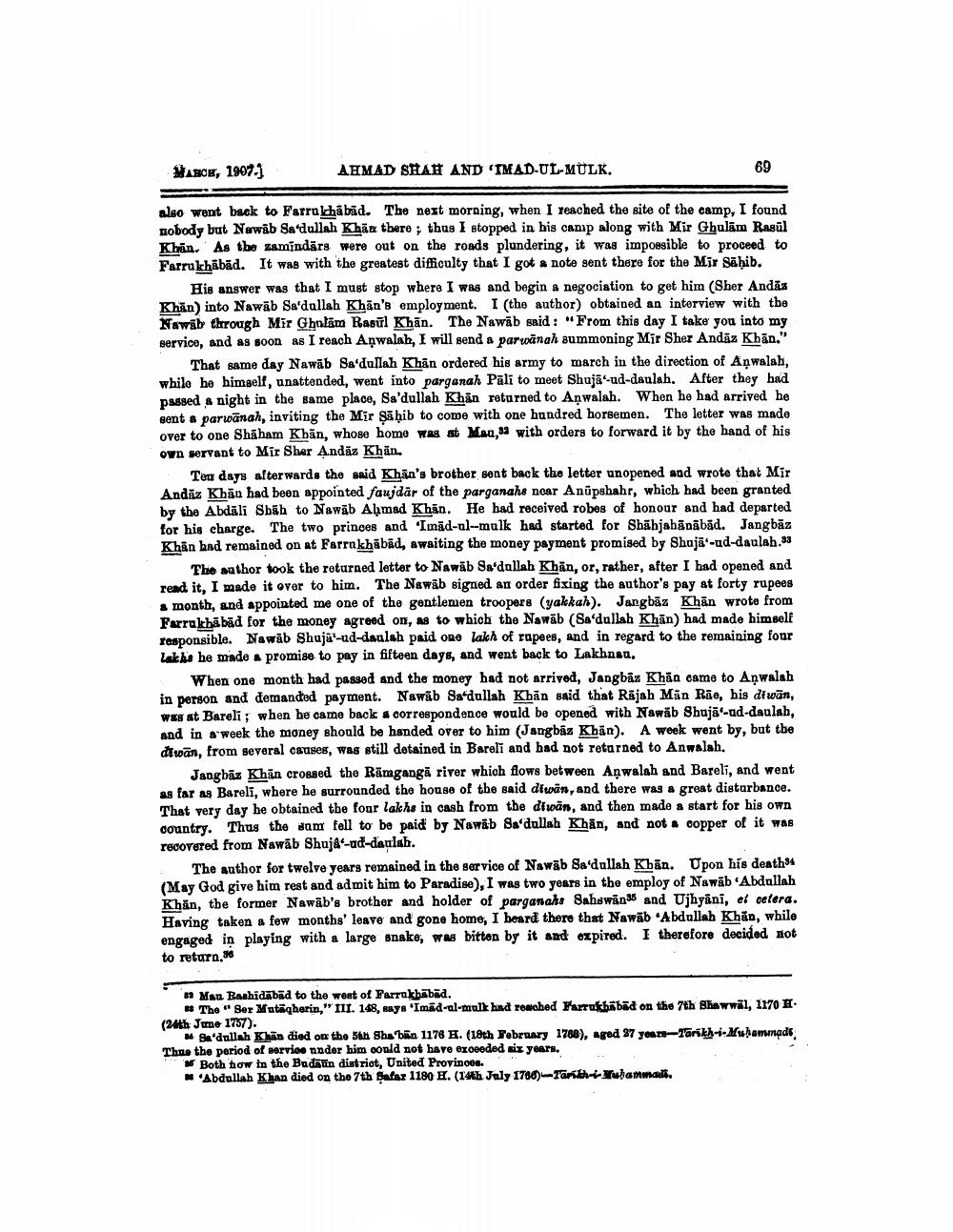________________
AHMAD SHAH AND 'TMAD-UL-MÜLK.
69
MARCH, 1907.1
also went back to Farrukhabad. The next morning, when I reached the site of the camp, I found nobody but Nawab Sa'dullah Khan there; thus I stopped in his camp along with Mir Ghulam Rasul Khan. As the zamindars were out on the roads plundering, it was impossible to proceed to Farrukhabad. It was with the greatest difficulty that I got a note sent there for the Mir Sahib.
His answer was that I must stop where I was and begin a negociation to get him (Sher Andās Khan) into Nawab Sa'dullah Khan's employment. I (the author) obtained an interview with the Nawab through Mir Ghulam Rasul Khan. The Nawab said: "From this day I take you into my service, and as soon as I reach Anwalah, I will send a parwanah summoning Mir Sher Andaz Khan."
That same day Nawab Sa'dullah Khan ordered his army to march in the direction of Anwalah, while he himself, unattended, went into parganah Pali to meet Shuja -ud-daulah. After they had passed a night in the same place, Sa'dullah Khan returned to Anwalah. When he had arrived he sent a parwanah, inviting the Mir Sahib to come with one hundred horsemen. The letter was made over to one Shaham Khan, whose home was at Man,33 with orders to forward it by the hand of his own servant to Mir Sher Andaz Khan.
Ten days afterwards the said Khan's brother sent back the letter unopened and wrote that Mir Andaz Khan had been appointed faujdär of the parganahs near Anupshahr, which had been granted by the Abdali Shah to Nawab Ahmad Khan. He had received robes of honour and had departed for his charge. The two princes and 'Imad-ul-mulk had started for Shahjahanabad. Jangbāz Khan had remained on at Farrukhabad, awaiting the money payment promised by Shuja'-ud-daulah.33
The author took the returned letter to Nawab Sa'dullah Khan, or, rather, after I had opened and read it, I made it over to him. The Nawab signed an order fixing the author's pay at forty rupees a month, and appointed me one of the gentlemen troopers (yakkah). Jangbaz Khan wrote from Farrukhabad for the money agreed on, as to which the Nawab (Sa'dullah Khan) had made himself responsible. Nawab Shuja'-ud-daulah paid one lakh of rupees, and in regard to the remaining four Lakhs he made a promise to pay in fifteen days, and went back to Lakhnau,
When one month had passed and the money had not arrived, Jangbaz Khan came to Anwalah in person and demanded payment. Nawab Sa'dullah Khan said that Rajah Män Rãe, his diwan, was at Bareli; when he came back a correspondence would be opened with Nawab Shuja-ud-daulah, and in a week the money should be handed over to him (Jangbaz Khan). A week went by, but the diwan, from several causes, was still detained in Bareli and had not returned to Anwalah.
Jangbaz Khan crossed the Ramganga river which flows between Anwalah and Bareli, and went as far as Bareli, where he surrounded the house of the said diwan, and there was a great disturbance. That very day he obtained the four lakhs in cash from the diwan, and then made a start for his own country. Thus the sum fell to be paid by Nawab Sa'dullah Khan, and not a copper of it was recovered from Nawab Shuja-ud-daulah.
The author for twelve years remained in the service of Nawab Sa'dullah Khan. Upon his death34 (May God give him rest and admit him to Paradise), I was two years in the employ of Nawab 'Abdullah Khan, the former Nawab's brother and holder of parganahs Sahswan and Ujhyānī, et cetera. Having taken a few months' leave and gone home, I heard there that Nawab Abdullah Khan, while engaged in playing with a large snake, was bitten by it and expired. I therefore decided not to return.36
sa Man Rashidābād to the west of Farrukhabad.
The "Ser Mutaqherin," III. 148, says 'Imad-al-mulk had reached Farrukhabad on the 7th Shawwal, 1170 H(24th June 1757).
a Sa'dullah Khan died on the 5th Sha'ban 1176 H. (18th February 1788), aged 27 years-Tarikh-i-Muhammad Thus the period of service under him could not have exceeded six years.
Both how in the Budaun district, United Provinces.
Abdullah Khan died on the 7th Safar 1180 H. (14th July 1766)Tarikh-i-Huḥammadi.




